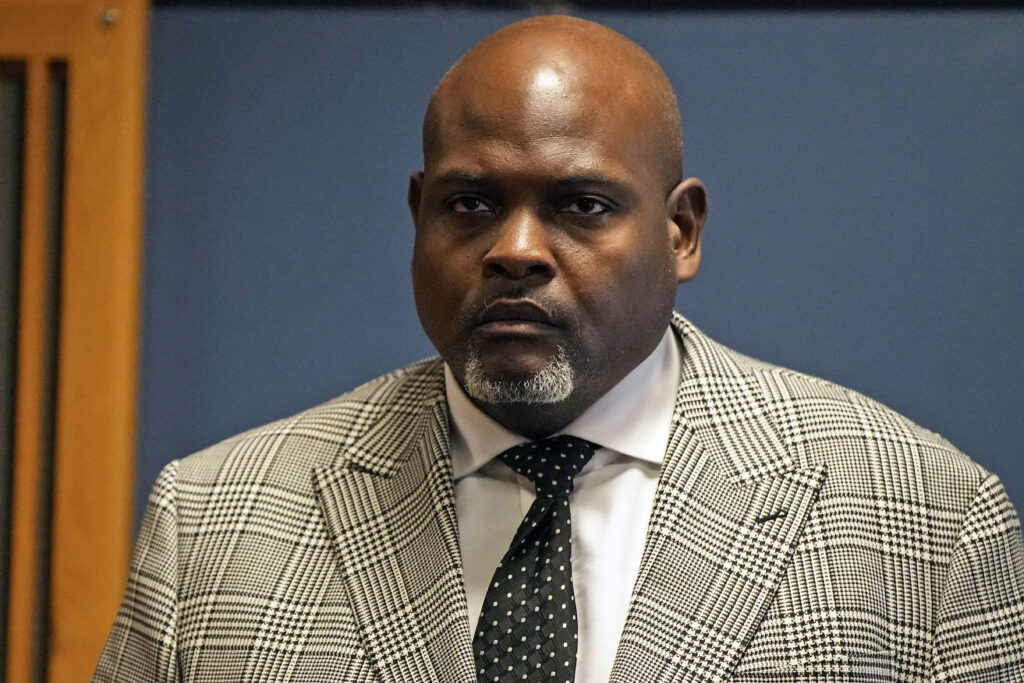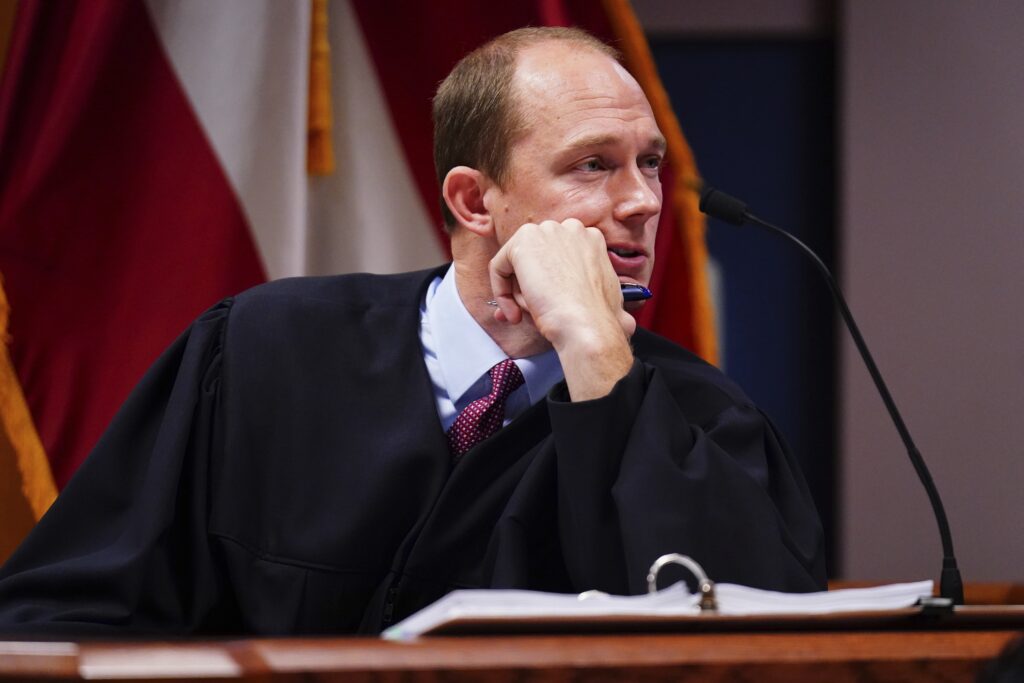
A hearing surrounding the fate of Fulton County, Georgia, District Attorney Fani Willis‘s prosecution of Donald Trump prompted a lawyer for the former president to raise the possibility that a star witness to Willis’s affair with special prosecutor Nathan Wade is lying about his recollections.
Presiding Superior Court Judge Scott McAfee has labeled Terrence Bradley, a former law partner and divorce attorney to Wade, a “star witness” for the bid by Trump and other co-defendants to dismiss Willis’s office from handling the sweeping racketeering case against them.

Nearly two hours into the hearing on Tuesday, Steve Sadow, a lawyer for Trump, pointed to Bradley’s testimony earlier in the hearing, during which Bradley said he was speculating in previous text messages with defense attorney Ashleigh Merchant, who first raised the allegations of Wade and Willis’s relationship in court when he said that the pair began dating shortly after meeting at a judges’ conference in 2019.
Bradley said repeatedly that he had been speculating when he sent text messages to Merchant about his belief that the relationship began before Willis brought the racketeering indictment.
Merchant, who represents co-defendant Mike Roman, had asked Bradley during the first hour of the hearing about where he obtained the information he relayed when he texted her that Willis and Wade’s relationship began after the 2019 judges’ conference, pointing to printouts of text messages that the pair exchanged.
Merchant asked Bradley: “Do you recall me asking you, ‘Do you think it started before she hired him?’ And you said, ‘Absolutely.’ Do you recall that?”
“I see that in the text messages, yes,” Bradley said.
But when Merchant asked Bradley where he had heard the relationship began after Willis left the district attorney’s office and became a judge in South Fulton, Georgia, Bradley said he was speculating.
“No one told me,” Bradley replied. “I was speculating.”
When it became Sadow’s turn to examine Bradley, he asked why Bradley had failed to tell Merchant that he was speculating.
“I don’t recall why I felt that it started at that time, but I do recall that he only met her, and I testified to that, that he met [Willis] at that conference in 2019,” Bradley said, claiming that he did not hear anything about the relationship directly from Wade that would lead him to believe Wade and Willis starting dating earlier than they acknowledged to the court.
Sadow, who attended the hearing remotely, repeatedly asked why Bradley would not have merely told Merchant, “I don’t know,” in response to her questions about the relationship timeline, to which Bradley said, “I have no answer for that.”

Trump’s attorney then suggested that Bradley does indeed know the reason, saying, “You don’t want to testify to that in court. … That’s the best explanation.”
Sadow also asserted that if Bradley did admit that he knew a relationship started as far back as 2019, it would show Willis and Wade lied under oath.
“Mr. Bradley, you realize that if you were to testify under oath that you knew from Mr. Wade that the relationship between him and Ms. Willis existed before the contract on Nov. 1 of 2021, that if you testified that you knew that from Mr. Wade, that would show that both Ms. Willis and Mr. Wade had lied under oath,” Sadow said. “You know that, don’t you?”
Bradley was grilled by other attorneys following Merchant and Sadow’s questions, prompting Richard Rice, an attorney for co-defendant Robert Cheeley, to ask Bradley whether “you pass on lies about your friends?”
Bradley responded that he “could have. I don’t know.”
It is unclear how Bradley’s testimony will affect the judge’s decision on whether to disqualify Willis or other prosecutors from the case. The so-called star witness was at times hesitant to speak on matters that defense attorneys pushed him to describe, often stating “I don’t recall” in response to questions.

Throughout the more than two-hour hearing, which was scheduled late Monday evening after Bradley had a private meeting with McAfee, the judge was seen taking many notes — including writing down when Bradley said he could not recall details of Wade’s relationship.
Clark Neily, the senior vice president for legal studies at the Cato Institute, suggested Sadow’s line of questioning was a “master class in effective courtroom advocacy.”
“Sadow knows he won’t get straight answers on key fact questions, so instead of fecklessly pressing for them, he’s driving home how clear it is that Bradley’s lying about his memory,” Neily posted to X, formerly known as Twitter.
The question of whether Willis and Wade were truthful about when their relationship began could pose a significant problem for the case that could lead to possible sanctions, though some have said that it may not be enough to prompt any disqualification of prosecutors.
CLICK HERE TO READ MORE FROM THE WASHINGTON EXAMINER
Summation arguments will take place at a hearing on Friday, when parties will make their closing arguments over a disqualification complaint that began in January. Merchant first filed the motion to disqualify Willis over the allegation that she financially benefited from Wade’s employment at the district attorney’s office.
Wade, who was in the courtroom on Tuesday, testified along with Willis earlier this month that their vacations were paid on Wade’s credit cards and then reimbursed by Willis in cash, though they said there are no documented records of the cash repayments.





